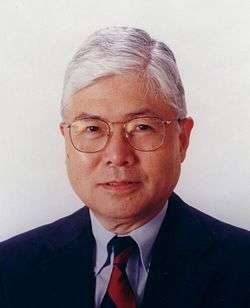Yoshito Kishi
Yoshito Kishi (岸 義人, Kishi Yoshito, born 13 April 1937 in Nagoya, Japan) is the Morris Loeb Professor of Chemistry at Harvard University. He is known for his contributions to the sciences of organic synthesis and total synthesis.

Kishi was born in Nagoya, Japan and attended Nagoya University, where he obtained both his BS and PhD degrees.[1] He was a postdoctoral research fellow at Harvard University where he worked with Robert Burns Woodward.[1] From 1966 through 1974, he was a professor of chemistry at Nagoya University.[1] Since 1974, Kishi has been a professor of chemistry at Harvard University.
Kishi's research has focused on the total synthesis of complex natural products. The accomplishments of his research group include the total syntheses of palytoxin, mycolactones, halichondrins, saxitoxin, tetrodotoxin, geldanamycin, batrachotoxin and many others.[2] Kishi has also contributed to the development of new chemical reactions including the Nozaki–Hiyama–Kishi reaction.[3]
Recognition
- 1999 Imperial Prize of the Japan Academy
- 2001 Tetrahedron Prize for Creativity in Organic Chemistry & BioMedicinal Chemistry [4]
- 2001 Ernest Guenther Award
- 2001 Person of Cultural Merit
- 2013 Order of the Sacred Treasure
See also
- Yoshimasa Hirata - Kishi's doctoral advisor.
- Hitoshi Nozaki
References
- Kishi, Yoshito; Rando, Robert R. (1998). "Structural Basis of Protein Kinase C Activation by Tumor Promoters". Accounts of Chemical Research. 31 (4): 9672–6. doi:10.1021/ar9600751. PMC 298563. PMID 2602368.
- Yoshito Kishi Archived October 18, 2010, at the Wayback Machine, Department of Chemistry and Chemical Biology, Harvard University
- Takai, K.; Tagashira, M.; Kuroda, T.; Oshima, K.; Utimoto, K.; Nozaki, H. (1986). "Reactions of alkenylchromium reagents prepared from alkenyl trifluoromethanesulfonates (triflates) with chromium(II) chloride under nickel catalysis". Journal of the American Chemical Society. 108 (19): 6048–50. doi:10.1021/ja00279a068. PMID 22175376.
- "Tetrahedron Prize for Creativity in Organic Chemistry or Bioorganic & Medicinal Chemistry". Elsevier. Archived from the original on September 9, 2014. Retrieved 28 January 2015.